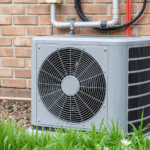Is it cheaper to heat with gas or electricity?
When looking to heat your home, one of the primary decisions you face is whether to use gas or electricity. The costs of heating with these two energy sources can vary greatly based on several factors, including your location, energy efficiency of your appliances, and local utility rates. Understanding these elements can help you decide which option is cheaper for your specific situation.
Understanding Energy Costs
First, let’s break down the costs involved. Generally, natural gas is often found to be cheaper than electricity for heating purposes. However, the actual savings can differ widely depending on your region. Here are some key points to consider:
- Gas Prices: Natural gas prices fluctuate based on market conditions, but they tend to be consistently lower than electricity rates when used for heating.
- Electricity Rates: The cost of electricity can vary significantly owing to location and demand. In some areas, electricity can be quite expensive, thus making gas a more economical heating option.
- Heating Efficiency: How efficiently your heating system converts energy into heat will impact your overall costs. Gas furnaces and electric heaters operate at different efficiencies.
Analysis of Heating Systems
To better understand whether it’s cheaper to heat with gas or electricity, consider the types of heating systems commonly used for each energy source:
| Heating Type | Typical Efficiency | Average Annual Cost |
|---|---|---|
| Gas Furnace | 80-98% | $800-$1,200 |
| Electric Heater | 100% | $1,200-$2,000 |
As the table shows, gas furnaces can have a lower annual cost when coupled with their efficiency, whereas electric heaters can be more expensive overall. It’s essential to remember that electric heaters are generally 100% efficient at converting energy to heat, but the higher energy rates can offset this advantage.
Regional Variability
Your geographical location plays a significant role in determining whether gas or electricity is a cheaper option for heating. For instance:
- Urban Areas: In cities, natural gas may be more accessible and affordable due to infrastructure.
- Rural Locations: Areas lacking natural gas supply might rely on electricity, leading to higher costs for heating.
- Local Policies: Some places offer incentives for using one energy source over another, impacting your overall costs.
It’s a good idea to research local energy policies and pricing through resources like your local utility company’s website or regulatory bodies that monitor energy costs.
Long-Term Considerations
In addition to immediate costs, you should also consider long-term factors that can influence your heating decision:
- Installation Costs: Initial costs of setting up a gas or electric heating system can vary greatly. Gas systems sometimes require significant installation and venting costs, while electric systems are often simpler to install.
- Maintenance: Gas heating systems can require more maintenance and checks than electric ones, potentially adding to your overall costs.
- Environmental Considerations: Electricity can often be generated from renewable sources, making it a more sustainable choice in some regions.
It’s essential to balance both cost and environmental impact when making your decision. Resources like Energy.gov provide information on efficient heating solutions based on energy type and regional considerations.
: Making Your Choice
Whether gas or electricity is the cheaper heating option depends significantly on your unique circumstances. While gas often presents lower direct costs due to cheaper fuel prices, electric heating holds advantages in some scenarios, particularly where renewable energy sources come into play. Assess your local rates, energy policies, and personal priorities to make the most informed decision for you and your household.
Factors Influencing Heating Costs
Heating costs can vary significantly based on several factors. If you’re trying to determine the best option for heating your home, understanding these elements can be incredibly helpful. Here’s a breakdown of the major influences on heating expenses.
Energy Source
The type of energy you use plays a significant role in your overall heating costs. The two most common sources are gas and electricity. Natural gas is often cheaper per unit than electricity due to the lower cost of production and distribution. However, electricity has become more prevalent in various regions, and depending on local energy markets, it may offer competitive pricing.
Efficiency of the Heating System
Your heating system’s efficiency is also integral to understanding your heating costs. An older furnace or electric heating system tends to be less efficient than newer models. Modern systems often come with high-efficiency ratings, meaning they convert a greater percentage of energy into usable heat.
Here are some efficiency ratings to consider:
- Gas Furnaces: Between 90% and 98% Annual Fuel Utilization Efficiency (AFUE)
- Electric Heat Pumps: Between 300% and 400% efficiency (using the Coefficient of Performance)
- Electric Resistance Heaters: About 100% efficiency
Climate and Geography
The area where you live significantly impacts heating costs. Colder climates require more heating, naturally increasing energy consumption. Conversely, in milder regions, heating needs may be lower, which could tilt the cost balance in favor of using electricity over gas. For instance, homes in northern states with harsh winters may find gas is the more economical option, while southern homes might rely more on electric heating.
Market Prices
Energy costs fluctuate based on market prices, which can be influenced by supply and demand, geopolitical events, and seasonal changes. For example, during winter, natural gas prices may rise due to increased demand. Being aware of current gas and electricity rates in your area can help you budget better. You can often find real-time prices on platforms like the U.S. Energy Information Administration.
Insulation and Home Design
The design of your home and how well it is insulated can dramatically impact your heating efficiency. Well-insulated homes minimize heat loss, leading to lower energy costs. Consider factors such as:
- Quality of insulation in walls, attics, and basements
- Sealing doors and windows to prevent drafts
- Heating zones in different areas of the house
Maintenance and Repairs
Regular maintenance of your heating system is crucial for efficiency. Systems that are not well-maintained can develop issues that lead to higher energy consumption. Simple tasks like changing filters, cleaning ducts, and checking for leaks can make a big difference in efficiency, therefore impacting costs.
Incentives and Rebates
Some regions offer incentives for using more efficient heating systems or for switching away from fossil fuels. Be sure to research available rebates or tax incentives that can ease installation costs for newer systems. Websites such as Energy.gov can provide useful information on these programs.
Table: Average Heating Costs
| Heating Source | Average Cost (per million BTUs) |
|---|---|
| Natural Gas | $10 |
| Electricity | $30 |
| Heating Oil | $15 |
Determining whether it’s cheaper to heat with gas or electricity requires considering these factors carefully. Prices may vary over time and between locations. Always analyze your specific situation and consult local utility providers for the most accurate information.
For more insights on energy efficiency and to compare heating options, visit Energy Star and National Renewable Energy Laboratory.
Comparing Efficiency: Gas vs. Electric Heating
When it comes to heating your home, you’re likely weighing the costs and efficiency of gas versus electric heating systems. Understanding the differences between these two fuels can help you save money and create a more comfortable living environment.
Understanding Energy Sources
Gas heating typically uses natural gas or propane, while electric heating runs on electricity. Both methods have their pros and cons, and the choice between them can significantly affect your monthly energy bills.
Cost of Installation
The initial installation cost of gas heating systems tends to be lower than electric systems. While gas furnaces are generally more affordable to purchase and install, you may need to factor in the costs of venting and connecting to natural gas lines. Electric systems, on the other hand, can be more costly to set up if you do not already have the necessary electrical wiring in place.
Typical Installation Costs:
- Gas Furnace: $2,500 – $4,500
- Electric Furnace: $3,500 – $5,000
Energy Efficiency Ratings
One crucial factor to consider is the energy efficiency of each type of heating system. Efficiency is measured using Annual Fuel Utilization Efficiency (AFUE) ratings for gas systems and Heating Seasonal Performance Factor (HSPF) for electric systems. Generally, gas heating systems have AFUE ratings of 80% to 98%, while electric systems can achieve HSPF ratings of 8 to 10.
| Heating Type | AFUE/HSPF Rating | Typical Efficiency (%) |
|---|---|---|
| Gas Heating | 80% – 98% AFUE | Higher efficiency |
| Electric Heating | 8 – 10 HSPF | Moderate efficiency |
Operational Costs
Once your heating system is installed, the ongoing costs will vary based on factors such as location, energy prices, and how often you use heating. Typically, natural gas prices are lower than electricity prices, which often makes gas heating cheaper in the long run. However, this can differ based on where you live, so consulting local energy companies can provide a clearer picture of operational costs.
Average Monthly Heating Costs:
- Gas Heating: $100 – $150
- Electric Heating: $150 – $250
Environmental Impact
Choosing between gas and electric heating also involves environmental considerations. Gas heating often emits carbon dioxide and other greenhouse gases but is generally considered more efficient. Electric heating can be cleaner, especially if powered by renewable resources. If you’re environmentally conscious, you may want to consider the source of your electricity before making a decision.
Maintenance Requirements
Gas heating systems usually require regular maintenance, such as checking for gas leaks and ensuring the venting system is clear. Electric heating systems are typically easier to maintain, as they have fewer moving parts. Regular check-ups and timely repairs can extend the life of either system.
Final Considerations
Your choice between gas and electric heating should be based on your specific needs and circumstances. Evaluate your local energy costs, installation fees, and environmental impact. Energy.gov offers valuable resources to help homeowners make informed decisions about heating systems. For more detailed comparisons, check out Consumer Reports.
No matter which option you choose, being informed can lead you to a more economical and efficient heating solution for your home.
Environmental Impact of Gas and Electric Heating
When considering how to heat your home, the environmental impact of gas and electric heating becomes essential. Both options have their advantages and disadvantages that can significantly affect natural resources and contribute to greenhouse gas emissions. Understanding these factors can help you make a more informed decision about which heating method is right for you.
Gas Heating: Environmental Considerations
Gas heating primarily relies on natural gas, which is a fossil fuel. While it burns cleaner than other fossil fuels like coal and oil, it still generates carbon dioxide (CO2) during combustion. Here are some key environmental aspects of gas heating:
- Greenhouse Gas Emissions: Natural gas emits about 50-60% less CO2 compared to coal when burned. However, it still contributes to global warming.
- Methane Leaks: Methane, a potent greenhouse gas, can leak during extraction and transportation, contributing significantly to climate change.
- Nonrenewable Resource: As a fossil fuel, natural gas is not a sustainable source of energy. Its extraction can also lead to issues like land degradation and water contamination.
Electric Heating: Environmental Considerations
Electric heating systems transform electrical energy into heat, and their environmental impact largely depends on how that electricity is generated. Here are some critical points to consider:
- Sources of Electricity: If your electricity comes from renewable sources like wind, solar, or hydro, electric heating can be much more eco-friendly. Conversely, if it comes from coal or natural gas, the environmental benefits diminish.
- Efficiency: Electric heating tends to be more efficient than gas heating. Electric systems can convert nearly all the energy used into heat, while gas systems lose some energy through exhaust gases.
- Carbon Footprint: With the ongoing shift towards cleaner energy production, the carbon footprint of electric heating is likely to decrease in the future.
Comparing Gas and Electric Heating
When weighing the environmental impacts of gas versus electric heating, various factors come into play that can affect your choice:
| Factor | Gas Heating | Electric Heating |
|---|---|---|
| Type of Fuel | Fossil Fuel | Varies (could be renewable) |
| GHG Emissions | Higher due to combustion | Depends on generation source |
| Efficiency | About 80-90% | Up to 100% |
| Sustainability | Nonrenewable | Potentially renewable |
Regulations and Incentives
Government regulations can also impact the environmental footprint of heating systems. Many cities and states are implementing stricter emissions standards for gas heating systems. Some offer incentives for switching to electric or renewable heating systems.
Utilizing resources to determine your best options can be valuable. Websites like Energy.gov and EPA.gov provide extensive information on energy efficiency and environmental guidelines. These resources can guide you in making more sustainable heating choices.
Future Considerations
As society moves towards more sustainable energy practices, the landscape of heating is likely to change. Innovations in electric heating technology, such as heat pumps, are becoming more common and efficient. This trend could make electric systems a more attractive option in the coming years.
Ultimately, your choice between gas and electric heating will depend on several factors. You’ll want to consider the source of your energy, your home’s specific heating needs, and what aligns best with your environmental values. By reviewing both options carefully, you can decide which heating method meets your needs while minimizing your impact on the environment.
Regional Differences in Heating Prices
When considering how to heat your home, understanding regional differences in heating prices is crucial. Factors such as local climate, energy sources, and demand all play a vital role in determining how much you’ll pay for heating. Let’s explore how these factors shape heating costs across different regions, focusing particularly on whether it’s cheaper to heat with gas or electricity.
In warmer regions, where temperatures rarely drop below freezing, natural gas may often be the more economical choice. Areas like the southern United States typically have mild winters, reducing the need for extensive heating. Conversely, states in the Northeast, where winters can be severe, might find electric heating systems to be cost-effective due to state incentives and rebates on utility costs. Keep in mind that regional demand also affects prices; during peak demand seasons, such as winter, you may see spikes in heating costs.
Another aspect to consider is the availability of resources. In regions with an abundance of natural gas, such as Texas and Pennsylvania, gas heating tends to be cheaper than electricity. In contrast, states like California, where electricity is generated from renewable resources, may offer competitive prices for electric heating solutions.
Here’s a simplified overview of heating costs for different regions across the US:
| Region | Typical Heating Cost (Gas) | Typical Heating Cost (Electricity) |
|---|---|---|
| Northeast | $1,000 – $1,500 | $800 – $1,200 |
| Midwest | $800 – $1,200 | $700 – $1,100 |
| South | $600 – $900 | $500 – $800 |
| West | $700 – $1,000 | $600 – $900 |
In recent years, heating prices have become more volatile due to changing regulations and market conditions. Natural gas prices have been affected by global demand and domestic drilling practices, which can vary significantly from year to year. Many utility companies regularly release reports about anticipated heating costs based on historical trends. For example, the U.S. Energy Information Administration provides useful insights into current and future heating costs.
Furthermore, the type of heating system you choose can greatly influence your bill. For instance, heat pumps are known for being highly energy efficient and may offer savings over traditional electric or gas systems. Areas that experience extreme seasonal changes might benefit from dual-fuel systems, which can optimize energy usage depending on the current fuel prices.
A significant aspect of regional differences in heating prices is government policies. Besides incentives for energy-efficient systems, some states impose taxes on specific heating methods. For example, you may find that states that promote renewable energy use offer lower electricity rates during certain times, which can make electric heating more appealing compared to gas. It’s essential to check with local energy suppliers to understand the applicable rates and any available rebates.
To navigate these regional distinctions effectively, you might want to consult with professionals in your area who can provide tailored advice based on your specific circumstances. Websites such as the National Renewable Energy Laboratory can offer valuable information on sustainable heating practices and cost-effective strategies for your home.
Ultimately, the answer to whether it’s cheaper to heat with gas or electricity greatly depends on where you live and the unique local factors that influence heating prices. By taking the time to investigate the options available in your region, you can make a more informed decision that not only saves you money but also maximizes your home’s energy efficiency.
Cost Analysis: Short-term vs. Long-term Savings
When considering how to heat your home, understanding the cost differences between gas and electricity is key. The expenses associated with heating can vary based on several factors. In this guide, we will analyze short-term costs and long-term savings to help you make an informed decision.
Understanding Short-term Costs
Your immediate costs will hinge on the energy prices in your area and the efficiency of your heating system. Gas is often cheaper than electricity in many regions, leading to lower monthly heating bills. However, the cost of installation and maintenance for gas heating systems can be higher. Here’s a brief look at typical short-term costs:
- Gas furnace installation: Generally ranges from $3,500 to $5,000.
- Electric furnace installation: Typically costs between $1,500 and $3,500.
- Average monthly gas bill: $70 – $150, depending on usage and local rates.
- Average monthly electric bill: $100 – $200.
Long-term Savings Analysis
When calculating long-term savings, it’s crucial to factor in efficiency, maintenance, and lifespan. Here’s how gas and electricity compare over time:
| Heating Source | Average Lifespan (Years) | Annual Maintenance Costs | Energy Efficiency (%) |
|---|---|---|---|
| Gas | 15-20 | $150 – $300 | 80-97% |
| Electric | 20-30 | $100 – $200 | 95-100% |
The longer lifespan of electric systems often results in lower costs over time, despite higher short-term installation costs. In contrast, while gas systems may offer lower monthly bills, ongoing costs for maintenance can add up.
Environmental Considerations
Beyond financials, you might want to consider the environmental impact. Electric heating can be powered by renewable energy sources, reducing your carbon footprint. Gas, on the other hand, burns fossil fuels, which can contribute to air pollution. Your energy source is essential to whether heating is environmentally friendly.
Choosing What’s Right for You
Ultimately, the decision to heat with gas or electricity relies on individual circumstances. Here are some questions to consider:
- What are the energy prices in your area?
- How long do you plan to stay in your current home?
- Are you concerned about environmental sustainability?
- What is your budget for installation and maintenance?
Answering these questions will guide you toward the best heating source for your needs.
For more detailed resources about this topic, visit Energy.gov for energy-saving tips, or check out Energy Star for efficient heating solutions.
It’s clear that both gas and electric heating options come with their own sets of pros and cons. Keep in mind the importance of both short-term and long-term financial considerations and how they align with your personal preferences and circumstances. By thoroughly evaluating your options and aligning them with your financial goals, you can make an informed decision that suits your lifestyle.
This comprehensive analysis should empower you to determine whether it is cheaper to heat with gas or electricity for your particular situation, ensuring both your home comfort and your wallet are well taken care of.
Tips for Reducing Heating Expenses Regardless of Energy Source
Heating your home can significantly impact your monthly expenses, no matter if you use gas or electricity. Finding ways to minimize these costs can help you stay comfortable while also keeping your budget in check. Here are several effective tips to reduce your heating expenses regardless of your energy source.
Maintain Your Heating System
Proper maintenance of your heating system is essential in ensuring its efficiency. A well-maintained system not only operates better but also consumes less energy. Here are some maintenance tips:
- Schedule regular professional inspections to check for any issues.
- Replace filters every few months to ensure smooth airflow.
- Keep vents and radiators clear of furniture or obstructions.
Upgrade Your Thermostat
Consider upgrading to a programmable or smart thermostat. These devices allow you to set heating schedules that match your lifestyle. Here’s how a smart thermostat can help:
- Adjusts the temperature automatically when you are away from home.
- Allows for zone heating, so you can keep certain areas of your home warmer than others when needed.
- Provides energy usage reports to help track your heating costs.
Insulate Your Home
Good insulation works as a barrier to keep the warmth in during the winter. Here are some ways to enhance your home’s insulation:
- Insulate walls, attics, and basements to minimize heat loss.
- Seal leaks around doors and windows with weatherstripping or caulking.
- Consider installing insulated curtains or thermal blinds at night.
Utilize Alternative Heating Sources
In addition to gas or electricity, consider utilizing alternative heating sources. These can be especially useful on mild days when you don’t need to heat the entire house. Options include:
- Space heaters in smaller areas where you spend the most time.
- Wood or pellet stoves as an additional heating source.
- Heating pads or blankets for personal warmth.
Lower the Thermostat
Another simple way to reduce heating costs is to lower your thermostat setting. A reduction of just a few degrees can lead to significant savings over time. Here’s what you can do:
- Try setting your thermostat to 68°F (20°C) during peak hours.
- Lower the setting to 60°F (16°C) when you’re away or asleep.
- Always dress warmly and use blankets to stay comfortable.
Monitor Energy Usage
Being aware of your energy usage provides insight into how much you spend on heating. Use these strategies to stay on top of it:
- Review your energy bills monthly to track changes and identify spikes.
- Utilize energy monitors to get real-time data on your heating consumption.
- Set goals for usage reduction to encourage energy-saving habits.
Consider Energy-Efficient Heating Options
If you are in the market for a new heating system, consider opting for energy-efficient models. Look for systems with a high Annual Fuel Utilization Efficiency (AFUE) rating. Energy-efficient options typically include:
- High-efficiency gas furnaces or boilers.
- Electric heat pumps, which are often more cost-effective than traditional electric heaters.
- Consider renewable energy sources such as solar heating systems.
| Heating Source | Average Cost per BTU |
|---|---|
| Natural Gas | $0.012 |
| Electricity | $0.036 |
For further guidance on energy savings and efficient heating solutions, check resources like Energy.gov for valuable tips and information on optimizing home energy use. Additionally, Energy Star offers insights into high-efficiency appliances.
Ultimately, reassessing your heating strategies can lead to substantial savings. By incorporating these tips into your daily routine, you can effectively reduce your heating expenses, whether you rely on gas or electricity. Moreover, being energy-conscious contributes to a sustainable future while keeping your comfort intact. Stay warm!
Key Takeaway:
When deciding whether it’s cheaper to heat your home with gas or electricity, several important factors come into play. First and foremost, it’s essential to consider not only the current prices of gas and electricity in your area but also their long-term efficiency and ability to provide warmth. Gas heating generally has lower energy costs per unit than electricity in many regions, which can make it a more economical choice initially. However, this may vary based on your local energy prices, so it’s vital to check current rates before making any decisions.
Efficiency also plays a significant role in heating costs. Gas heaters are often more efficient in converting energy into heat, leading to greater savings on your utility bill over time. On the other hand, electric heating systems, such as heat pumps, can provide effective heating, especially in milder climates.
Another aspect to consider is the environmental impact of each heating method. Natural gas is a fossil fuel, and while it emits less CO2 when burned compared to electric heating systems that rely on coal or other less clean energy sources, some electricity providers offer renewable energy options that can reduce your carbon footprint significantly.
Regional differences cannot be overlooked. Prices can fluctuate widely depending on your location, and understanding energy market dynamics where you live is crucial. Heating costs might be lower in areas where fossil fuels are abundant and readily available compared to regions where electricity is produced from renewable sources.
Regardless of whether you choose gas or electric heating, there are several strategies to curtail heating expenses. Simple actions such as improving insulation, sealing drafts, or using programmable thermostats can lead to significant savings.
While gas heating may typically be cheaper upfront and more efficient in many cases, the cost-effectiveness of your choice ultimately depends on your regional pricing, environmental considerations, and long-term goals for sustainability. Always weigh these factors carefully to determine the best heating solution for you.
Conclusion
Understanding whether it is cheaper to heat with gas or electricity requires you to consider multiple factors. Your decision should be influenced by local energy costs, the efficiency of your heating system, and the environmental impact of each energy source.
Gas heating generally provides a more cost-effective solution in many areas due to lower per-unit costs. However, electricity can be equally efficient, especially with advanced systems like heat pumps. The overall efficiency of each heating method cannot be ignored, as this plays a crucial role in both immediate and long-term savings.
It’s important to recognize the regional differences in heating prices, as they vary greatly depending on your location and availability of resources. This is why doing some local research can make a significant difference in your heating expenses.
Beyond just the type of energy, evaluating short-term versus long-term savings is critical. While gas heating may appear cheaper initially, electric systems can offer substantial savings over time due to lower maintenance and operational costs.
No matter which option you choose, there are several practical tips to reduce heating expenses. Simple actions such as sealing drafts, using programmable thermostats, and ensuring proper insulation can significantly lower your monthly bills, regardless of whether you heat with gas or electricity.
Taking all these factors into account, the answer to the question of whether it is cheaper to heat with gas or electricity will ultimately depend on your individual circumstances, preferences, and priorities. Making an informed choice tailored to your situation is the key to enjoying a warm and cost-effective home.







Leave a Reply